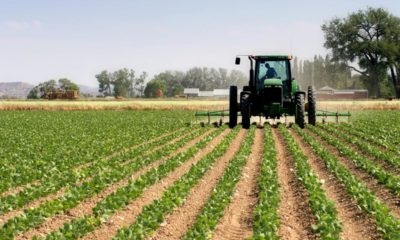- FG Decries N3.2tn Gap in Annual Agriculture Revenue
The Federal Government has said that due to poor investment during previous administrations, Nigeria has lost an annual revenue of $9bn (N3.2tn) that should have accrued from the agriculture sector.
The Minister of State for Agriculture, Senator Heineken Lokpobiri, stated this at a reception and lunch organised in his honour by the Founder of the Afe Babalola University, Ado Ekiti, Chief Afe Babalola.
“Before President Buhari came, Nigeria was losing $9bn revenue annually in the agriculture sector,” the News Agency of Nigeria quoted him as saying.
The minister said Nigeria also lost over 240 metric tonnes of fish production in the world market that could have increased its foreign exchange earnings and boosted the economy.
He said, “In Nigeria, we are not producing enough fish to feed our population; that is why we are relying heavily on importation.
“The deficit between demand and supply was 2.5 million metric tonnes annually; this is about 320 containers.
“You can imagine the quantum of revenue we lost to low production in this sector alone.
“Knowing that our products were being taken to other West African nations to be processed and rebranded, we introduced certification policy for all our products in order to have right and proper certificates for our products and in order not to affect the Gross Domestic Product negatively.”
Lokpobiri made reference to Belgium, a country with a population of less than five million, whose annual revenue from agriculture was 35 billion euros.
He said, “The agriculture minister of Belgium told me that the difference between agriculture in Africa and the West is technology and innovation.
“That was why the Federal Government in partnership with the World Bank earmarked $250m to train young graduates in agribusiness. Our universities must pay attention to technology and innovation.
“They must emulate what ABUAD is doing in the agriculture sector because I wonder what would happen to us in future if we cannot feed just 180 million people.”
The minister said a lot had been done by the present administration to rebrand agriculture.
He urged Nigerian universities to emulate ABUAD’s landmark exploits in farming, saying that the university had set a pace for the country to actualise food security status.
Lokpobiri expressed fear that the country might witness serious famine in future with the projection that its population might hit 250 million by 2030.
He warned that it was high time other levels of governments started planning to checkmate such occurrence.
The minister promised that the Federal Government would partner ABUAD in the area of agriculture and training of young graduates to boost food production.

 Forex3 weeks ago
Forex3 weeks ago


 Naira2 weeks ago
Naira2 weeks ago
 Billionaire Watch2 weeks ago
Billionaire Watch2 weeks ago






 Naira3 weeks ago
Naira3 weeks ago






 Naira2 weeks ago
Naira2 weeks ago


 Naira1 week ago
Naira1 week ago




 Naira4 weeks ago
Naira4 weeks ago






 Naira1 week ago
Naira1 week ago


















